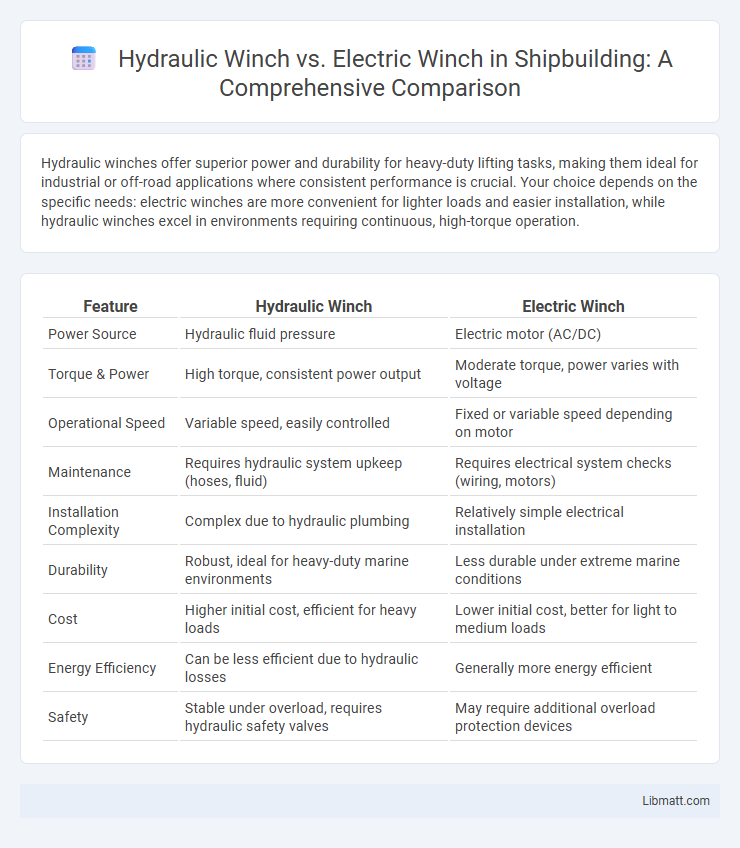Hydraulic winches offer superior power and durability for heavy-duty lifting tasks, making them ideal for industrial or off-road applications where consistent performance is crucial. Your choice depends on the specific needs: electric winches are more convenient for lighter loads and easier installation, while hydraulic winches excel in environments requiring continuous, high-torque operation.
Table of Comparison
| Feature | Hydraulic Winch | Electric Winch |
|---|---|---|
| Power Source | Hydraulic fluid pressure | Electric motor (AC/DC) |
| Torque & Power | High torque, consistent power output | Moderate torque, power varies with voltage |
| Operational Speed | Variable speed, easily controlled | Fixed or variable speed depending on motor |
| Maintenance | Requires hydraulic system upkeep (hoses, fluid) | Requires electrical system checks (wiring, motors) |
| Installation Complexity | Complex due to hydraulic plumbing | Relatively simple electrical installation |
| Durability | Robust, ideal for heavy-duty marine environments | Less durable under extreme marine conditions |
| Cost | Higher initial cost, efficient for heavy loads | Lower initial cost, better for light to medium loads |
| Energy Efficiency | Can be less efficient due to hydraulic losses | Generally more energy efficient |
| Safety | Stable under overload, requires hydraulic safety valves | May require additional overload protection devices |
Overview of Hydraulic and Electric Winches
Hydraulic winches use fluid power to generate high torque, making them ideal for heavy-duty industrial and off-road applications where continuous use and rugged conditions prevail. Electric winches operate using an electric motor powered by batteries or vehicle electrical systems, offering ease of installation, cost-effectiveness, and suitability for lighter loads and moderate use. Both types of winches provide mechanical advantage for pulling or lifting, but hydraulic winches excel in durability and sustained performance, while electric winches prioritize convenience and portability.
Key Differences Between Hydraulic and Electric Winches
Hydraulic winches operate using fluid pressure from a hydraulic system, delivering higher torque and continuous power ideal for heavy-duty applications, while electric winches rely on electric motors powered by batteries, offering ease of use and simpler installation for moderate loads. The key difference lies in their power sources and performance: hydraulic winches provide sustained, high-force pulling with minimal heat generation, whereas electric winches are limited by battery capacity and prone to overheating under extended use. Maintenance demands also vary, as hydraulic winches require regular inspection of fluid levels and seals, contrasting with electric winches needing battery care and electrical component checks.
Power Source Comparison
Hydraulic winches draw power from a vehicle's hydraulic system, offering continuous operation and superior pulling force ideal for heavy-duty tasks, while electric winches rely on battery power, providing ease of installation and maintenance with limited runtime. Your choice depends on application needs, as hydraulic winches excel in durability and strength, whereas electric winches are favored for convenience and portability. For demanding environments requiring sustained power, a hydraulic winch is often the more reliable option.
Performance and Load Capacity
Hydraulic winches deliver superior performance with higher torque output, making them ideal for heavy-duty applications requiring continuous operation under extreme load conditions. Electric winches offer efficient load capacity for moderate tasks, typically supporting weights up to several thousand pounds with easier installation and maintenance. Hydraulic systems excel in durability and heat dissipation, ensuring consistent power during prolonged lifts, while electric models prioritize convenience and energy efficiency in lighter industrial or recreational use.
Installation Requirements
Hydraulic winches require a compatible hydraulic system with sufficient pressure and flow, making installation more complex and typically suited for vehicles already equipped with hydraulics. Electric winches demand a strong electrical system, often necessitating a high-capacity battery or alternator upgrade to handle power consumption during operation. Your choice should consider the ease of installation relative to your vehicle's existing infrastructure and the skill level required for proper setup.
Maintenance and Longevity
Hydraulic winches offer superior durability and require less frequent maintenance due to their robust design and fewer electrical components susceptible to corrosion and wear. Electric winches, while easier to install and operate, demand regular battery checks and electrical system upkeep to ensure optimal performance and longevity. Your choice should consider the operating environment and maintenance capabilities to maximize the lifespan and reliability of the winch.
Energy Efficiency and Operational Costs
Hydraulic winches offer higher energy efficiency as they utilize hydraulic fluid power, reducing electrical consumption and minimizing heat generation during heavy-duty operations. Electric winches demand a continuous power supply, often resulting in higher operational costs due to electricity usage and the need for battery maintenance or replacement. Your choice depends on balancing initial investment with long-term savings in energy consumption and maintenance expenses.
Suitability for Various Applications
Hydraulic winches excel in heavy-duty industrial and marine applications due to their powerful torque and continuous operation capabilities, making them ideal where durability and high load capacity are crucial. Electric winches suit lighter to medium-duty tasks such as vehicle recovery and small equipment lifting, offering ease of use, lower maintenance, and portability. Your choice should align with the specific demands of the job, including load requirements, power availability, and operational environment.
Safety Features and Considerations
Hydraulic winches offer enhanced safety through their inherent ability to maintain holding power without constant power input, reducing risks of slippage or sudden release under load. Electric winches rely on brake systems and require careful monitoring of electrical components to prevent overheating and ensure reliable load control. Both systems demand regular maintenance and consideration of load capacity ratings to avoid accidents during heavy-duty operations.
Choosing the Right Winch for Your Needs
Hydraulic winches offer high power and durability for heavy-duty applications, making them ideal for industrial and off-road use where consistent performance under load is critical. Electric winches provide convenience and ease of use, best suited for lighter tasks and scenarios where you have access to a reliable power source. Understanding your specific load requirements and operating environment will help you choose the right winch to efficiently meet your needs.
Hydraulic winch vs electric winch Infographic

 libmatt.com
libmatt.com